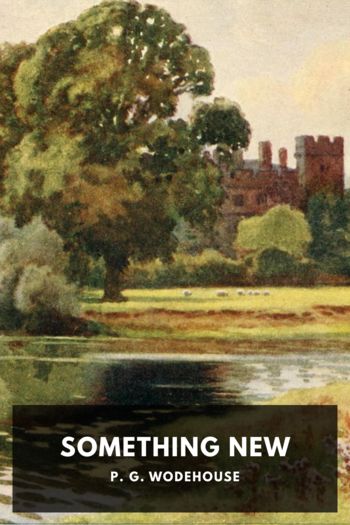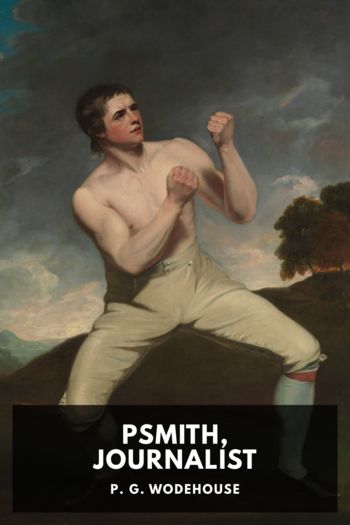Leave It to Psmith - P. G. Wodehouse (i wanna iguana read aloud .TXT) 📗

- Author: P. G. Wodehouse
Book online «Leave It to Psmith - P. G. Wodehouse (i wanna iguana read aloud .TXT) 📗». Author P. G. Wodehouse
“Save me embarrassment?”
“Precisely. When I came into the smoking-room of our mutual club that afternoon when you had been entertaining Comrade McTodd at lunch, I found him on the point of passing out of your life for ever. It seems that he had taken umbrage to some slight extent because you had buzzed off to chat with the florist across the way instead of remaining with him. And, after we had exchanged a pleasant word or two, he legged it, leaving you short one modern poet. On your return I stepped into the breach to save you from the inconvenience of having to return here without a McTodd of any description. No one, of course, could have been more alive than myself to the fact that I was merely a poor substitute, a sort of synthetic McTodd, but still I considered that I was better than nothing, so I came along.”
His lordship digested this explanation in silence. Then he seized on a magnificent point.
“Are you a member of the Senior Conservative Club?”
“Most certainly.”
“Why, then, dash it,” cried his lordship, paying to that august stronghold of respectability as striking a tribute as it had ever received, “if you’re a member of the Senior Conservative, you can’t be a criminal. Baxter’s an ass!”
“Exactly.”
“Baxter would have it that you had stolen my sister’s necklace.”
“I can assure you that I have not got Lady Constance’s necklace.”
“Of course not, of course not, my dear fellow. I’m only telling you what that idiot Baxter said. Thank goodness I’ve got rid of the fellow.” A cloud passed over his now sunny face. “Though, confound it, Connie was right about one thing.” He relapsed into a somewhat moody silence.
“Yes?” said Psmith.
“Eh?” said his lordship.
“You were saying that Lady Constance had been right about one thing.”
“Oh, yes. She was saying that I should have a hard time finding another secretary as capable as Baxter.”
Psmith permitted himself to bestow an encouraging pat on his host’s shoulder.
“You have touched on a matter,” he said, “which I had intended to broach to you at some convenient moment when you were at leisure. If you would care to accept my services, they are at your disposal.”
“Eh?”
“The fact is,” said Psmith, “I am shortly about to be married, and it is more or less imperative that I connect with some job which will ensure a moderate competence. Why should I not become your secretary?”
“You want to be my secretary?”
“You have unravelled my meaning exactly.”
“But I’ve never had a married secretary.”
“I think that you would find a steady married man an improvement on these wild, flowerpot-throwing bachelors. If it would help to influence your decision, I may say that my bride-to-be is Miss Halliday, probably the finest library-cataloguist in the United Kingdom.”
“Eh? Miss Halliday? That girl down there?”
“No other,” said Psmith, waving fondly at Eve as she passed underneath the window. “In fact, the same.”
“But I like her,” said Lord Emsworth, as if stating an insuperable objection.
“Excellent.”
“She’s a nice girl.”
“I quite agree with you.”
“Do you think you could really look after things here like Baxter?”
“I am convinced of it.”
“Then, my dear fellow—well, really I must say … I must say … well, I mean, why shouldn’t you?”
“Precisely,” said Psmith. “You have put in a nutshell the very thing I have been trying to express.”
“But have you had any experience as a secretary?”
“I must admit that I have not. You see, until recently I was more or less one of the idle rich. I toiled not, neither did I—except once, after a bump-supper at Cambridge—spin. My name, perhaps I ought to reveal to you, is Psmith—the p is silent—and until very recently I lived in affluence not far from the village of Much Middlefold in this county. My name is probably unfamiliar to you, but you may have heard of the house which was for many years the Psmith headquarters—Corfby Hall.”
Lord Emsworth jerked his glasses off his nose.
“Corfby Hall! Are you the son of the Smith who used to own Corfby Hall? Why, bless my soul, I knew your father well.”
“Really?”
“Yes. That is to say, I never met him.”
“No?”
“But I won the first prize for roses at the Shrewsbury Flower Show the year he won the prize for tulips.”
“It seems to draw us very close together,” said Psmith.
“Why, my dear boy,” cried Lord Emsworth jubilantly, “if you are really looking for a position of some kind and would care to be my secretary, nothing could suit me better. Nothing, nothing, nothing. Why, bless my soul …”
“I am extremely obliged,” said Psmith. “And I shall endeavour to give satisfaction. And surely, if a mere Baxter could hold down the job, it should be well within the scope of a Shropshire Psmith. I think so, I think so. … And now, if you will excuse me, I think I will go down and tell the glad news to the little woman, if I may so describe her.”
Psmith made his way down the broad staircase at an even better pace than that recently achieved by the departing Baxter, for he rightly considered each moment of this excellent day wasted that was not spent in the company of Eve. He crooned blithely to himself as he passed through the hall, only pausing when, as he passed the door of the smoking-room, the Hon. Freddie Threepwood suddenly emerged.
“Oh, I say!” said Freddie. “Just the fellow I wanted to see. I was going off to look for you.”
Freddie’s tone was cordiality itself. As far as Freddie was concerned, all that had passed between them in the cottage in the west wood last night was forgiven and forgotten.
“Say on, Comrade Threepwood,” replied Psmith; “and, if I may offer the suggestion, make it snappy, for I would be elsewhere. I have man’s work before me.”
“Come over here.” Freddie drew him into a far corner of the hall and lowered his voice to a whisper. “I say, it’s all right, you know.”
“Excellent!” said Psmith. “Splendid! This is great news. What





Comments (0)